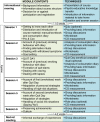Development of an integrative cessation program for co-smokers of cigarettes and cannabis: demand analysis, program description, and acceptability
- PMID: 24025478
- PMCID: PMC3848026
- DOI: 10.1186/1747-597X-8-33
Development of an integrative cessation program for co-smokers of cigarettes and cannabis: demand analysis, program description, and acceptability
Abstract
Background: Tobacco and cannabis use are strongly interrelated, but current national and international cessation programs typically focus on one substance, and address the other substance either only marginally or not at all. This study aimed to identify the demand for, and describe the development and content of, the first integrative group cessation program for co-smokers of cigarettes and cannabis.
Methods: First, a preliminary study using expert interviews, user focus groups with (ex-)smokers, and an online survey was conducted to investigate the demand for, and potential content of, an integrative smoking cessation program (ISCP) for tobacco and cannabis co-smokers. This study revealed that both experts and co-smokers considered an ISCP to be useful but expected only modest levels of readiness for participation.Based on the findings of the preliminary study, an interdisciplinary expert team developed a course concept and a recruitment strategy. The developed group cessation program is based on current treatment techniques (such as motivational interviewing, cognitive behavioural therapy, and self-control training) and structured into six course sessions.The program was evaluated regarding its acceptability among participants and course instructors.
Results: Both the participants and course instructors evaluated the course positively. Participants and instructors especially appreciated the group discussions and the modules that were aimed at developing personal strategies that could be applied during simultaneous cessation of tobacco and cannabis, such as dealing with craving, withdrawal, and high-risk situations.
Conclusions: There is a clear demand for a double cessation program for co-users of cigarettes and cannabis, and the first group cessation program tailored for these users has been developed and evaluated for acceptability. In the near future, the feasibility of the program will be evaluated.
Trial registration: Current Controlled Trials ISRCTN15248397.
Figures
References
-
- Richter KP, Kaur H, Resnicow K, Nazir N, Mosier MC, Ahluwalia JS. Cigarette smoking among marijuana users in the United States. Subst Abus. 2005;25:35–43. - PubMed
-
- Detailed data Table 6.9B - Types of illicit drug use in the past month among persons aged 18 to 25, by past month cigarettes use: percentages, 2010 and 2011. http://www.samhsa.gov/data/NSDUH/2011SummNatFindDetTables/NSDUH-DetTabsP....
-
- Radtke T, Keller R, Krebs H, Hornung R. Der Tabakkonsum Jugendlicher und junger Erwachsener in den Jahren 2001 bis 2009/10. Tabakmonitoring – Schweizerische Umfrage zum Tabakkonsum. [The tobacco consumption of young people in Switzerland between 2001 and 2009/10. Tobacco monitoring Switzerland - Swiss survey of tobacco consumption.] Zurich: Psychologisches Institut der Universität Zürich, Sozial- und Gesundheitspsychologie; Retrieved from http://www.tabakmonitoring.ch/Berichte/Jugendliche/Forschungsbericht/Ges....
Publication types
MeSH terms
Associated data
LinkOut - more resources
Full Text Sources
Other Literature Sources
Medical


